Is your cat a small one just like mine? Being a cat lover, I can understand your concern for your cat’s size and weight. Honestly, small cats are cuter and seek more attention easily. It is my personal opinion. You can differ from mine. A question might be popping up in your head “Why is my cat so small/big?”
There can be a number factors which can affect your cat’s size, weight and appearance. Different cat’s having blood relations from different breeds differ in size from each other. There can be several health factors too. Genetics and sex also play an important role in this regard. Your cat’s diet might be nutrient deficient and doesn’t fulfill. She might not be getting protein in good quantity or simply it can be just because of stress.
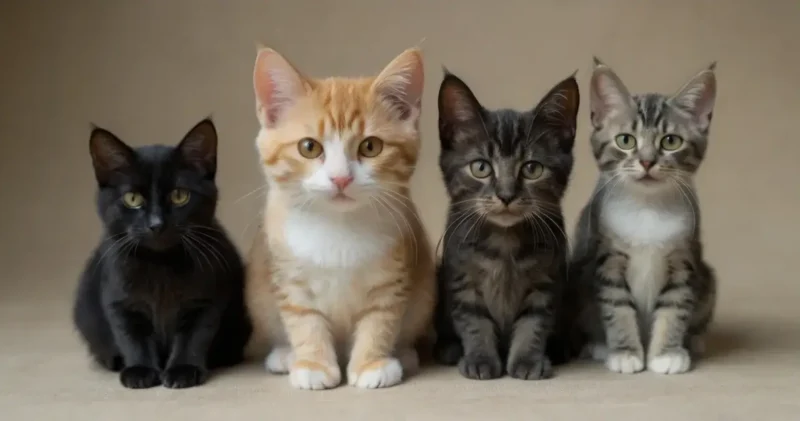
To further explore more on this topic, let us dive together in this article to answer your query.
Is My Cat Still Growing? Why Is My Cat So Small?
The first 210 days following your cat’s birth are crucial for its growth. On average, it takes approximately 280 days, or roughly 9 months, for a cat to reach its full size, with 75% of its growth occurring in the first 7 months. After the initial 7 months, the growth process generally slows down by 4-5 times. One thing you must be sure of is your cat’s diet. Make sure to buy proper cat food from the market that contains all the required nutrients for a cat’s healthy life. Some breeds, like Maine Coons continue to grow until 1 year after birth.
As a cat’s owner, it’s easy for me to relate to your concerns. Many of us get worried before the time falls in. If your cat is smaller than one year, there’s no need to worry. However, if your cat is above 1 year of age, you should seek an advice from an experienced vet.
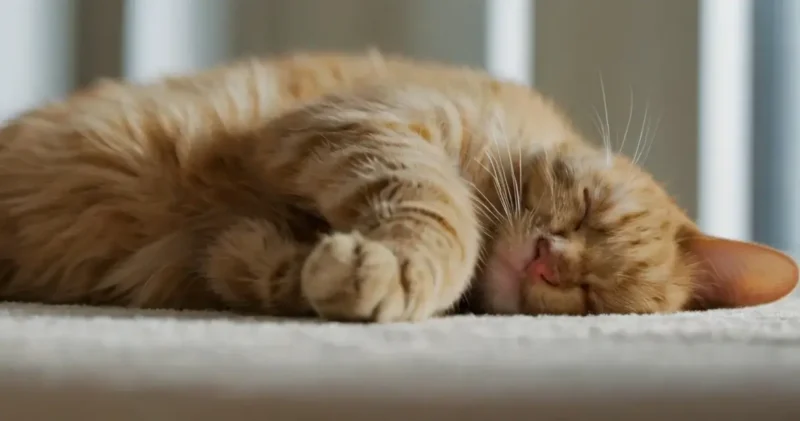
Still if you are concerned about your cat’s growth, you can consult a vet. There might be some medical issues too.
What Nutrition is Required for a Healthy Cat?
A cat’s diet is one of the most concerning questions for pet parents. Most of us, whether we have a cat or not, love them and enjoy taking care of their diet. For a healthy and appropriately-sized cat, it is crucial to fulfill all nutritional requirements at every stage of their life. Even if your cat is currently healthy and good in size, a poor diet can turn them into a weak and timid one.
As a cat grows, their nutritional requirements change with their age. To make it convenient for you, I have explained the required nutrition and its sources for cats at every age group.
Nutritional Diet for Kittens
Here your concern might be, Till what age can we call a cat ‘kitten’? almost in first year after your cat’s birth, it reaches to its extreme size. During their period you can call them kitten. Most cats exhibit a change in their behavior after the first year of their age. At this time, they have turned into an adult cat.
Here is a link to buy pet calming products at the cheapest rates:
Kittens require a well-balanced diet for comprising of a number of nutrients for their healthy growth. Here are they listed below along with their purpose.
- Protein Protein is required by both humans and animals for their muscle development.
- Calcium Calcium is crucial to keep bones strong. There must be a proper balance between calcium and phosphorous.
- Fat Fatty acids like omega 3 and omega 6 serve as one of the greatest source of energy.
- Vitamins Vitamin A, D, E are required for healthy growth of cats.
- Mineral Iron and zinc are essential to boos metabolism. It avoids the risk factor of turning your cat into an obese one.
- Fiber Little fiber is required to manage the digestive system. It maintains smooth flow of flesh in intestines.
- Water To avoid dehydration, kittens should be served with water after regular intervals.
Sources
Canned kitten food is one of the best choices to fulfill all your kitten’s nutrition requirements. You can also use chicken or fish to meet its protein need. Milk will fulfill all calcium requirements. Choose foods that minimize or exclude fillers like corn, wheat, and soy. Kittens need nutrient-dense foods, and fillers offer little nutritional value.
You can consult a vet to design a customized diet chart for your cat.
Nutritional Diet for Adult Cats
Typically, a cat has a lifespan of around 15 years, with the first year often considered its golden childhood period. After this initial year, your adorable kitten transitions into an adult cat. Just as we gradually introduce solid foods to a newborn baby until their digestive system matures, a kitten’s diet differs from that of an adult cat. However, there are also many similarities between the two stages of life.
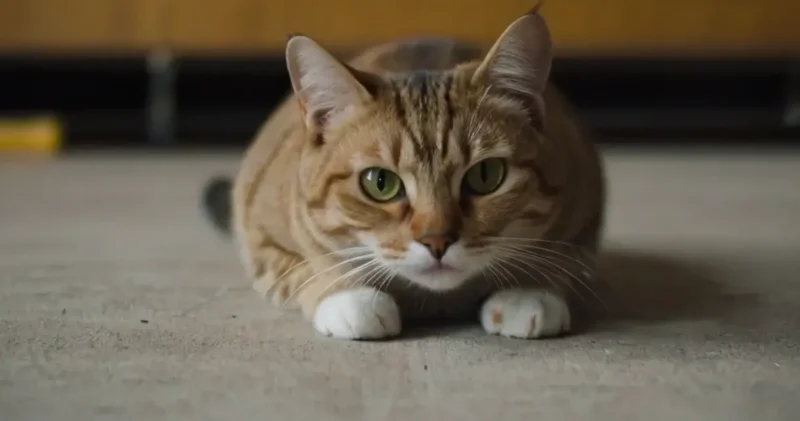
If you don’t offer a well-balanced diet to your healthy feline friend, there are a number of chances that she might get weaker and provide space for the question why is my cat so small . Following are the required nutrients to maintain a healthy weight and keep your child pet active.
- Taurine taurine is an amino acid that crucial for your cat’s eyes and heart rate.
- Carbohydrates you can include carbohydrates as a part of your cat’s diet in little quantity but they are not much essential.
- L-carnitine this amino acid helps to maintain body’s weight.
- Dental health offering sugar to your cat can create dental issues. To avoid such issues, many dental products are used.
- Weight management products these products contain a number of nutrients which helps a cat to maintain its weight
- Omega 3 and omega 6 fatty acids help in avoiding inflammation and improve skin.
- Animal based protein animal-based protein keeps muscles healthy
Sources
Even though adult cats may enjoy sharing our meals, it’s important to be aware that certain human foods can be highly toxic to them. Instead, consider serving them boiled chicken breasts, which provide a good source of protein. Hill’s Science Diet Perfect Weight is widely recognized as one of the most reputable brands for cat food globally, helping to maintain a healthy weight. Additionally, incorporating wet canned foods into their diet can ensure they receive essential nutrients.
Some adult cats are very much moody. If your cat doesn’t want to have canned food, you can cheer it up by offering a couple of bite of your own meal but this shouldn’t be a routine practice.
What is a Healthy Weight for Cats?
For all cats, there can’t be an ideal weight. It depends on their gender and breed they belong to. Its important for cat owners to be aware of their cat’s breed-specific weight. Here for your convenience, I have mentioned the ideal weight for some breeds.
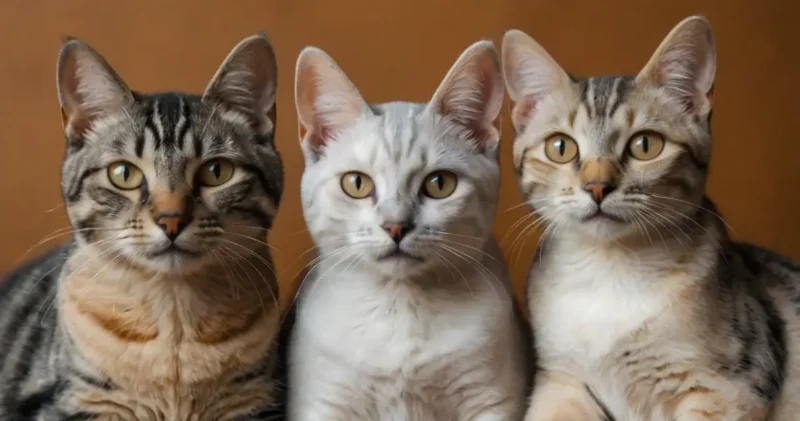
- Siamese: Siamese cats typically weigh between 8 to 12 pounds (3.6 to 5.4 kilograms).
- Maine Coon: Maine Coons ideal weight can range from 13 to 18 pounds (5.9 to 8.2 kilograms) or more.
- Persian: Persian cats tend to be smaller and may have an ideal weight between 7 to 12 pounds (3.2 to 5.4 kilograms).
- Bengal: Bengal cats usually weigh between 8 to 15 pounds (3.6 to 6.8 kilograms).
- Sphynx: Sphynx weigh between 6 to 12 pounds (2.7 to 5.4 kilograms).
- British Shorthair: British Shorthairs are medium to large cats with an ideal weight range of 9 to 18 pounds (4.1 to 8.2 kilograms).
- Ragdoll: Ragdolls ideal weight can be anywhere from 12 to 20 pounds (5.4 to 9.1 kilograms).
You can judge a short haired cat’s weight simply by looking at its ribs. If they are easy to feel and you notice a dip in their waistline, your cat has an ideal weight. If you can’t feel its ribs, it is slightly over weight and has healthy fat but if you can’t even find waistline your cat is may be an obese one.
Why Do Cats Gain Weight? Why is My Cat So Big?
Why is my cat so big ? Since we found many cats small or mediocre in size, ideal weight of a cat becomes a concern of cat owners owing big cats. Some cats are only bigger in size but there are some which are obese too. Having a big cute fluffy cat is not a matter of concern but owning an obese cat is a point to ponder.
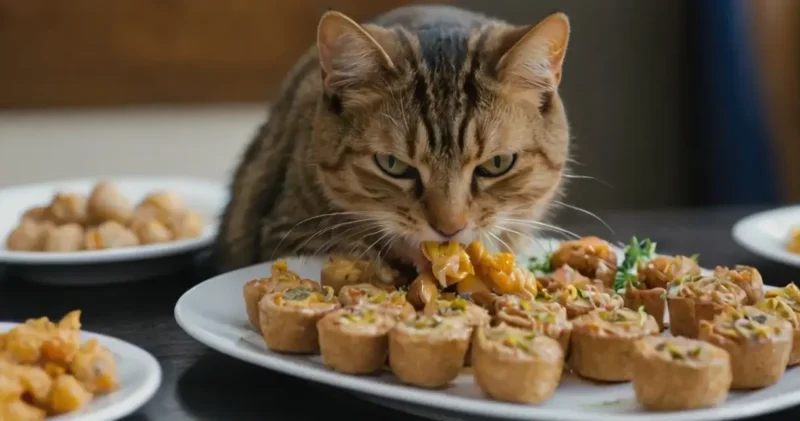
There are several factors, based on which cats differ in size but the main issues are the environment and the diet your cat is feeding on. All these factors are listed below:
- Hypertension
- Cardiovascular diseases
- Neutering
- Breed
- Dry-food diet only
- Lack of activity and free feeding
Even with a nutritious diet, some cats can still become obese, which can be concerning. However, this issue can be addressed by involving your cat in various activities and monitoring its food intake. Providing ample water is also beneficial as it helps boost metabolism.
Still if you can not observe any improvement, its better to consult an experienced vet. Although there are some breeds which are generally heavier than an average cat. In such cases, being bigger is not harmful for your feline friend. There are some other reasons too which you can explore going through this article: click here
How to Help Your Cat Maintain a Healthy Weight?
Off-course reducing or increasing body’s weight is not an activity your cat could do on its own. It’s the pet owners who engage their pet in a couple of activities, manage their schedule and find some time for their pet to reduce your cat’s stress and have some playful time.
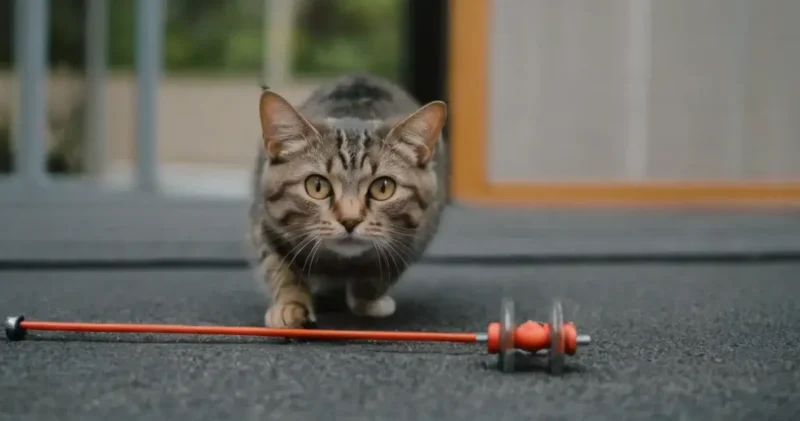
Being obese has a number of harmful effects on your cat which can even risk its life. Neither you should expect rapid weight loss nor rapid gain. Every process takes some time for its execution. If your pet doesn’t demonstrate ideal weight, you can adopt several measures mentioned below:
- Outdoor playtime
- Monitoring their BCS
- Extend or squeeze the intervals between meals
- Changing their diet
The best way to help your cat manage its weight is to redesign its diet chart and intervals. If you have a weak cat, you can increase the number of meals per day or simply multiply the quantity by 1.25 or 1.5 . On the contrary, if you have an obese cat, engage in outdoor activities and slowly bring a decrease in quantity you feed it per meal. Here is a link to an article where you can explore ways to battle with obesity of your cat https://www.metrovetchicago.com/services/cats/blog/9-ways-help-your-cat-battle-obesity
Do Cat’s Size Depends Upon Gender?
Yes, just like humans every living thing in the world can be easily differed by just having first loo on them because of gender. Female cats are generally smaller I size than the male ones. However, the ratio of difference varies from breed to breed.
In certain breeds like Maine Coons and Norwegian Forest Cats, there can be a noticeable contrast in size between males and females. Typically, males tend to be larger and heavier. Conversely, in other breeds, the disparity in size between male and female cats is minimal. While less conspicuous, it’s established that gender indeed influences a cat’s size.
If you have concerns about your cat’s size or if you notice significant changes in its weight, it’s a good idea to consult with a veterinarian for a thorough evaluation.
Do Smaller Cats Live Longer?
It is scientifically proved that smaller cats with lower weight tend to live longer than those healthy and bulky cats. This is due to following reasons:
- Lower metabolic rate: Smaller cats generally have slower metabolic rates compared to larger cats. A slower metabolism can lead to less wear and tear on the body over time, potentially contributing to a longer lifespan.
- Reduced strain on organs: Smaller cats have less body mass, which means their internal organs don’t have to work as hard to support them. This reduced strain on organs like the heart and kidneys can result in better overall health and longevity.
- Lower risk of obesity: Smaller cats require fewer calories than larger cats to maintain their weight. This lower caloric requirement, combined with their smaller size, makes them less prone to obesity, which is a significant risk factor for many health problems in cats, including diabetes, arthritis, and heart disease.
- Genetic factors: Some smaller cat breeds have been selectively bred for their longevity and overall health. Breeders often prioritize breeding for traits associated with a longer lifespan, such as robust health and vitality.
- Reduced risk of certain health conditions: Smaller cats may be less susceptible to certain health conditions that are more common in larger breeds, such as hip dysplasia and certain types of cancer.
Do Cats of Different Breeds Differ in Sizes?
Yes, cats do differ in sizes because of their breeds. Following table supports my claim.
| SR.NO | BREED | AVERAGE WEIGHT |
|---|---|---|
| 1. | Maine Coon | 13-18 POUNDS |
| 2. | Siamese | 8-12 POUND |
| 3. | Persian Cat | 7-12 POUND |
| 4. | Bengal Cat | 8-15 POUND |
| 5. | Sphynx | 6-12 POUND |
| 6. | British Shorthair | 9-18 POUND |
Cat breed size chart
Breeds do affect the size of your cat but it is influenced by other factors too which include its gender, diet, nutrition and medical issues. For a cat’s evaluation, these factors should also be brought under light.
Common Health Issues That Affect Cat’s Size
There are some common health issues becoming a hurdle for your cat to attain its ideal weight and size. These medical issues are listed below
- Hyperthyroidism
- Kidney disease
- Diabetes
- Food allergies
- Heart disease
- Stress and anxiety
- Hormonal disorders
- Neurological conditions
If your cat is a patient to any of these life risking diseases, you must have an immediate visit to nearest veterinarian clinic. There after passing through some examinations, proper treatments will be started. You can click here to explore more about these health concerns.
Conclusion
Why is my cat so small or big? It is a true fact; all pet owners are concerned for their pet’s proper growth and sometimes get worried without any reason. There are multiple factors which affect the cat’s growth and weight. All of them are discussed in detail above in the article.
Only thing we can conclude with is to stay calm if you get notified with the news of some serious disease diagnosed in your pet. Today medical science has made much progress resulting in inventing a cure for every disease. However, some cats take more than usual time to reach their ideal weight and size thus your support matters a lot for your pet. Hope so you have found an answer to the question why is my cat so small or so big after going through this blog.
The best step you can take in this regard is to consult a vet and design a diet rich in all required nutrient for proper growth.
FREQUENTLY ASKED QUESTIONS
We will be delighted to find you reading our other posts too. Here are links for a few of them:
https://petswhirl.com/category/cats/
Can Cats Eat Banana Bread? 8+ reasonings
Why do cats run away? 7 secrets revealed

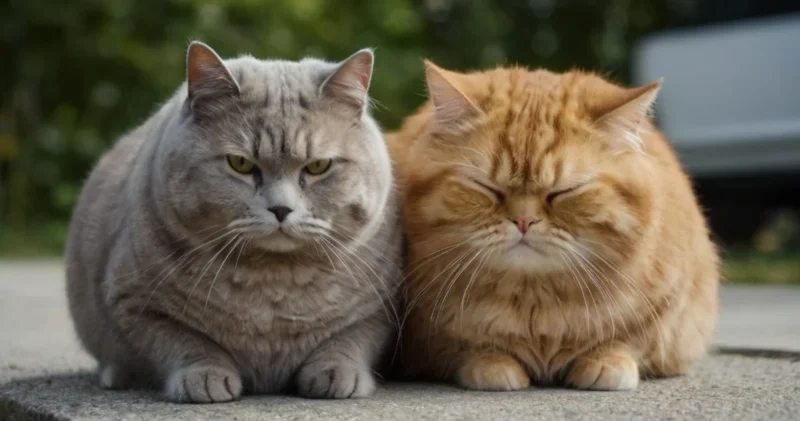
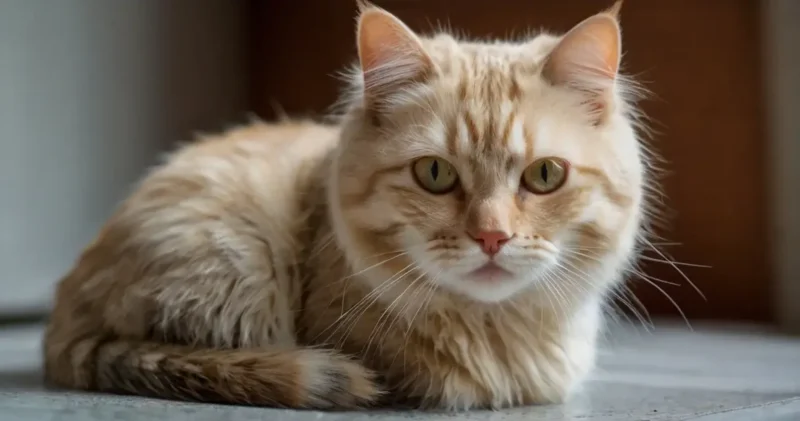
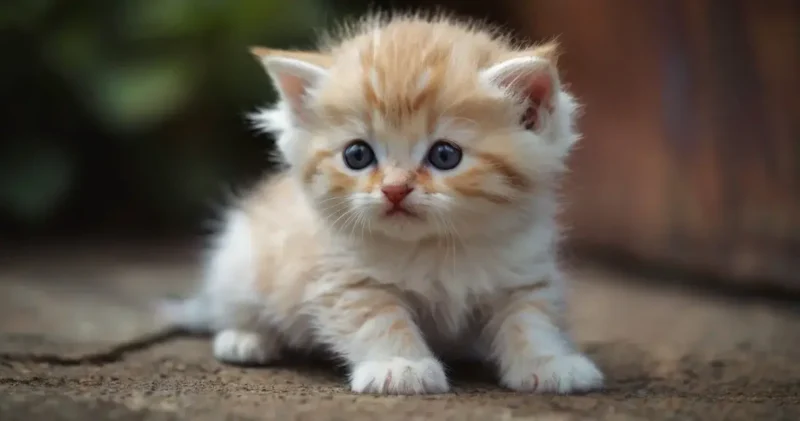
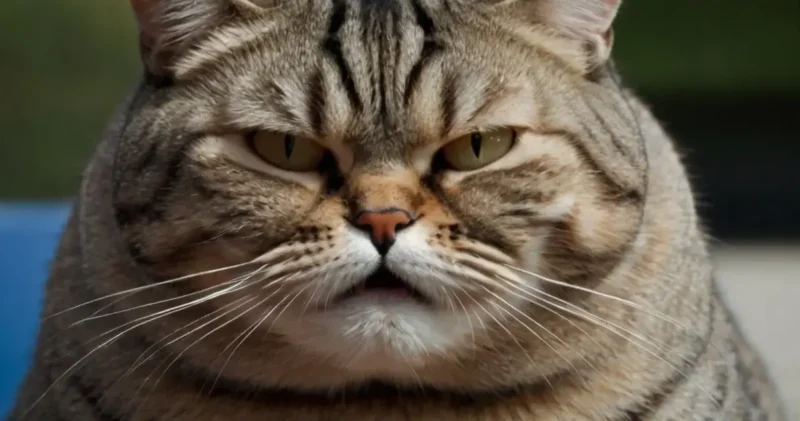
1 thought on “Why Is My Cat So Small Or Big? Mystery Revealed”